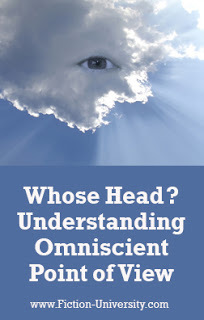 By Janice Hardy, @Janice_Hardy
By Janice Hardy, @Janice_Hardy
This week's Refresher Friday takes an updated look at writing the omniscient point of view.One of the more challenging point of views to write is the omniscient point of view. You'd think it would be easiest, since it's "someone outside the story telling the story," and the author fits that description, but an omniscient narrator makes it easier to fall into a common writing issues, such as infodumping and telling.
For those unfamiliar with the term, third person omniscient point of view is when somewhere other than a character in the book is telling the story. This outside narrator knows things the characters don't, can make comments about what's happening (or about to happen) or see inside the heads of other characters.
That's the key to omniscient point of view: it conveys things the characters don't or can't know.Seems easy enough, right?
The trouble is, a detached third person limited can sound a
lot like third person omniscient, especially if it's not changing characters. So much so, that sometimes it's hard to know the difference.
Continue ReadingWritten by Janice Hardy. Fiction-University.com
Published on July 12, 2019 03:30
